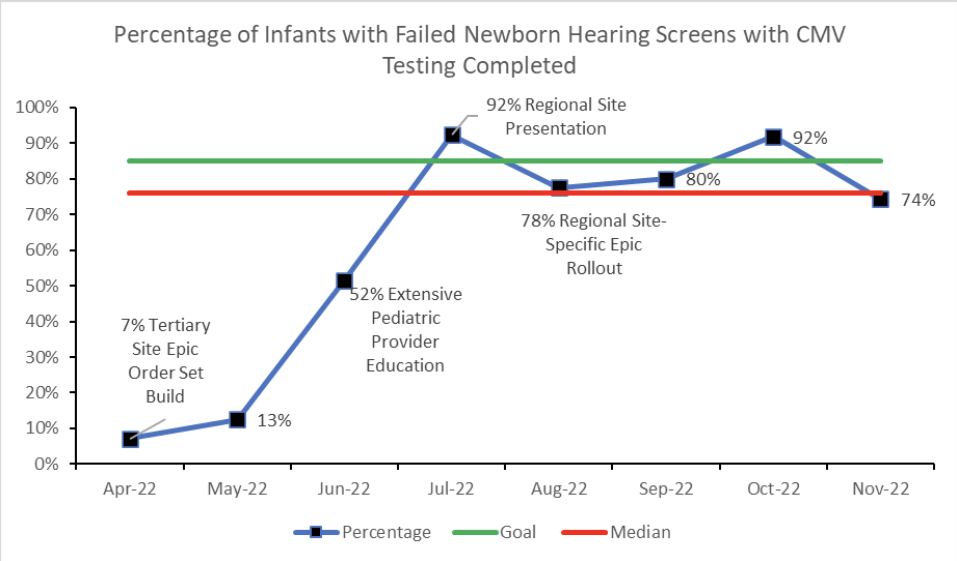Back
Background: Congenital cytomegalovirus (cCMV) infection is the most common congenital infection and the 2nd leading cause of childhood hearing loss. Identification and antiviral treatment of cCMV can help prevent progression of hearing loss.
Objective: Our goal was to screen 80% of babies with failed hearing screens for cCMV via urine or saliva PCR at an urban tertiary center and 9 regional newborn nurseries. We aimed to refer 90% of infected newborns for infectious disease evaluation and treatment within 2 weeks.
Design/Methods: We used Model for Improvement methodology and rapid cycle PDSAs under the guidance of a multi-disciplinary team of stakeholders. PDSA cycles included creation of a standardized, evidence-based order set, staff education and follow-up audits with provider feedback. Our intervention began at our tertiary center followed by expansion to the regional sites. Collected data included % failed hearing screens tested, % infected infants referred for evaluation, subjective provider feedback on the process and added workload.
Results: Appropriate cCMV testing increased from 7% to 73% from 4/2022 to 11/2022 (Fig 1). Of the 273 newborns that failed screens, 192 were successfully screened. 3 infants who screened positive for CMV were successfully referred for evaluation.
Conclusion(s): Implementation of a standardized process for cCMV testing in newborns with failed hearing screens proved successful. All cCMV positive patients were successfully referred to infectious disease clinic for further treatment. Future PDSAs will focus on increasing process reliability to decrease variation and expanding this process to further regional sites.

Hospital Medicine: Newborn Care
Hospital Medicine 2
758 - Congenital Cytomegalovirus Infection: Implementing a Targeted Testing and Referral Process for Congenital Hearing Loss
Friday, April 28, 2023
5:15 PM – 7:15 PM ET
Poster Number: 758
Publication Number: 758.12
Publication Number: 758.12
Richard McCormick, Levine Children's Hospital, Charlotte, NC, United States; Victoria Hayes Robert, Levine Children's Hospital, Charlotte, NC, United States; Ashley Carr, Levine Children's Hospital, Charlotte, NC, United States; Jasmyne-Rian Charles, Atrium Health, Charlotte, NC, United States; Rishi Laroia, Levine Children’s Hospital at Atrium Health, Charlotte, NC, United States; Amina Ahmed, Levine Children’s Hospital, Charlotte, NC, United States; Melissa Schutt, Levine Children's Hospital, Charlotte, NC, United States

Richard McCormick, MD
Resident
Levine Children's Hospital
Charlotte, North Carolina, United States
Presenting Author(s)
Background: Congenital cytomegalovirus (cCMV) infection is the most common congenital infection and the 2nd leading cause of childhood hearing loss. Identification and antiviral treatment of cCMV can help prevent progression of hearing loss.
Objective: Our goal was to screen 80% of babies with failed hearing screens for cCMV via urine or saliva PCR at an urban tertiary center and 9 regional newborn nurseries. We aimed to refer 90% of infected newborns for infectious disease evaluation and treatment within 2 weeks.
Design/Methods: We used Model for Improvement methodology and rapid cycle PDSAs under the guidance of a multi-disciplinary team of stakeholders. PDSA cycles included creation of a standardized, evidence-based order set, staff education and follow-up audits with provider feedback. Our intervention began at our tertiary center followed by expansion to the regional sites. Collected data included % failed hearing screens tested, % infected infants referred for evaluation, subjective provider feedback on the process and added workload.
Results: Appropriate cCMV testing increased from 7% to 73% from 4/2022 to 11/2022 (Fig 1). Of the 273 newborns that failed screens, 192 were successfully screened. 3 infants who screened positive for CMV were successfully referred for evaluation.
Conclusion(s): Implementation of a standardized process for cCMV testing in newborns with failed hearing screens proved successful. All cCMV positive patients were successfully referred to infectious disease clinic for further treatment. Future PDSAs will focus on increasing process reliability to decrease variation and expanding this process to further regional sites.

